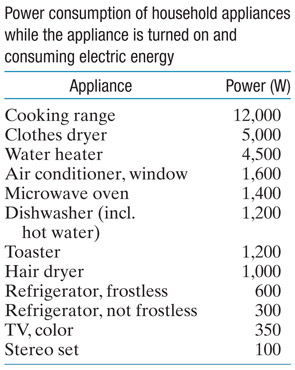
Well, actually power and energy
1,000 Watts = 1 kiloWatt (kW) = 1,000 J / s
Is the appliance that takes the most power the one that uses the most energy?
Since $\frac{E}{t} = P$
a little algebra $\Rightarrow$ $$ E = P \cdot t$$ So, for example, if an appliance draws power at a rate of 300 W = 300 J/s, and you run it for 50 seconds, then the energy used is...
$$300\frac{J}{s} * 50\,s = 15,000 J$$
so Power * time = energy. Which of these is a unit of energy? of power? neither?
kilowatts,
watts / hour,
kiloJoules,
milliJoules / day,
kilowatts * hours

Kilowatt$\cdot$hours ="kWh" is fairly commonly used--e.g. on electric bills.
How much energy do you use (in kWh):
In many homes the refrigerator is the appliance that uses the most energy over the course of a year. (Eia.doe.gov)
David MacKay suggests that good units to use to think about your personal energy consumption are average energy used per day for one person: $$\frac{\text{kWh}}{\text{person}\cdot\text{day}}$$
To discuss in groups of 3-4: You have a device to measure instantaneous power consumption that tells you that when you're charging your laptop computer it draws 60 Watts of electrical power. What else would you need to know to estimate the average energy consumption of your computer in MacKay's suggested units? What if you don't charge it every day? Give some sample numbers and show the result.
We've got two "KILL A WATT" meters that let you measure the electrical power usage of various appliances. To use the meter:
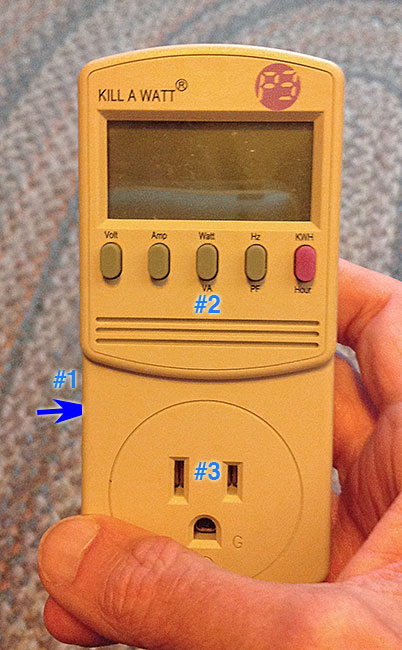 Plug the meter into the wall. A number close to 120 will show up on the screen. This is the AC voltage detected in your wall socket.
Plug the meter into the wall. A number close to 120 will show up on the screen. This is the AC voltage detected in your wall socket.
To estimate how much power you use with a particular appliance:
Appliances with rechargeable batteries, like laptop computers or cell phones, are a bit of a different case. If the battery is charging, you see one (higher) power reading. If the battery is already charged and it's plugged in, you'll see a different, lower power reading. To figure out the energy used, we will need to know how much energy it takes to charge the device to support all the time you use it for. The time you *use* your cellphone is not as important for this calculation as the time it takes to *charge* your cellphone. So, here's what to measure:
 U.S.
Energy Information Administration figures for 2008 said we used 3.8 trillion kWh / year.
U.S.
Energy Information Administration figures for 2008 said we used 3.8 trillion kWh / year.
This works out to about ~30 kWh per day, per person.
This means that one person uses 30 kWh of *energy* in the course of one day. But power is energy / time, so that means a typical American consumes an average power of:
$$P=\frac{E}{time} = \frac{30kWh}{24 h}=1.25 kW.$$
So, 100 people would need a power station generating 125 kW on average.
Households: 107 million households used 1140 billion kWh/yr
This is about 10 kWh per day, per person: our home usage. The rest is our share of industrial/hospital/school/etc use.
Could solar power meet our household needs?
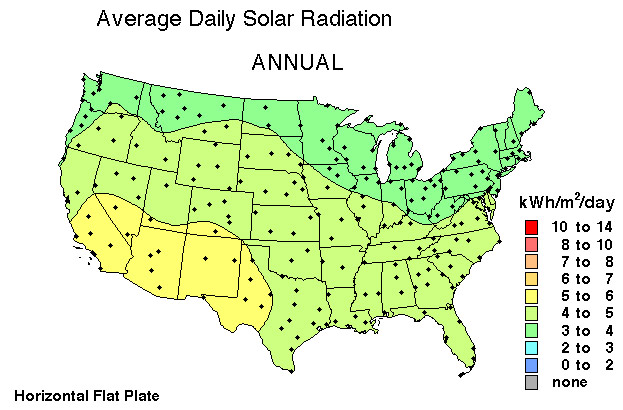
Typical family usage (Paul's!) ~$\frac{500 k W h}{m o n t h} \cdot \frac{1 m o n t h}{ 30 d a y s }$ ~17 kWh / day.
So, for 5 people, that's about 3-4 kW*hrs per day per person, the solar energy falling on 1 square meter of N. Indiana in an average day.
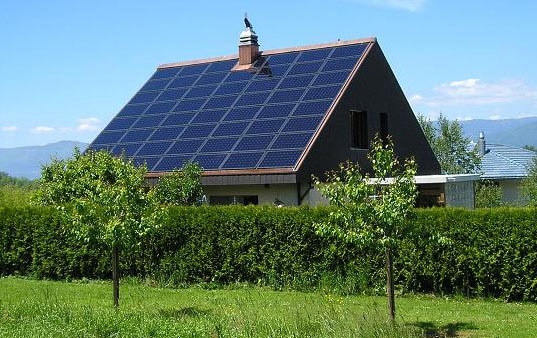 Current solar photovoltaic (PV) devices convert about
15% (~ 1/7) of the energy that falls on them into electricity. $=>$ we'd need
about 7 square meters of solar panels per person.
Current solar photovoltaic (PV) devices convert about
15% (~ 1/7) of the energy that falls on them into electricity. $=>$ we'd need
about 7 square meters of solar panels per person.
Is 7 m${}^2$ / persons a ridiculous amount of land??
 Compare this with the land area we as a society have dedicated to
another public good: the interstate highway system. It's ~75,000
km long with an average
density of 1000 km${}^2$ for every 800 km of length. That's an area of
94,000 square km. Dividing this by the current population of ~300 million,
this works out to ~300 square meters of Interstate per
person.
Compare this with the land area we as a society have dedicated to
another public good: the interstate highway system. It's ~75,000
km long with an average
density of 1000 km${}^2$ for every 800 km of length. That's an area of
94,000 square km. Dividing this by the current population of ~300 million,
this works out to ~300 square meters of Interstate per
person.
Both wind and solar are not *on* all the time, so some sort of supplementary storage is needed.
You can

How many seconds / hour = "seconds per hour" = "seconds in each hour"?
There are 60 seconds in each minute: 60 s/ min.
There are 60 minutes in each hour: 60 min / hour.
"60 minutes in each hour, and 60 seconds in each of those minutes" = 60 min/hr $\times$ 60 sec/min = 3600 sec / hr = "3600 seconds in each hour".
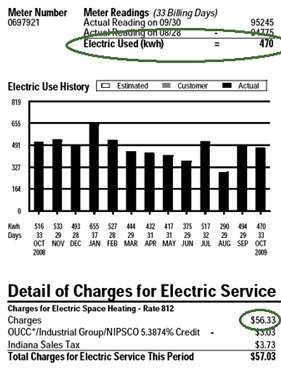 We
said $W=P \cdot t$
We
said $W=P \cdot t$
kwh=kilowatt hour= $10^3$ (J/s) $\cdot$ 1 hour $\times (3600 s)/(1 hr)= $ 3.6 million J
Cost of a 1 kwh of electricity: \$56.33 / 470 kwh = \$0.12 / 1 kwH
What would I pay for the ElectricE for the 5800 J needed to get one of you up three flights? More than a dollar? Less than a penny?
| market cost | cost per kWh | cost if $\rightarrow$ electricity |
|
|---|---|---|---|
| coal | $40 / ton | $0.004 | $0.012 |
| natural gas | $10 per million cf | $0.03 | $0.09 |
| gasoline | $2.69 / gal | $0.09 | $0.27 |
| electricity | retail from NIPSCO | $0.12 | $0.12 |
| solar PV | ref | $0.17 - 0.70 | $0.17 - 0.70 |
| AAA battery | $1.50 per battery | $1000.00 | $1000.00 |
 What
does a kWh worth of food calories cost?
What
does a kWh worth of food calories cost?
[Writing]